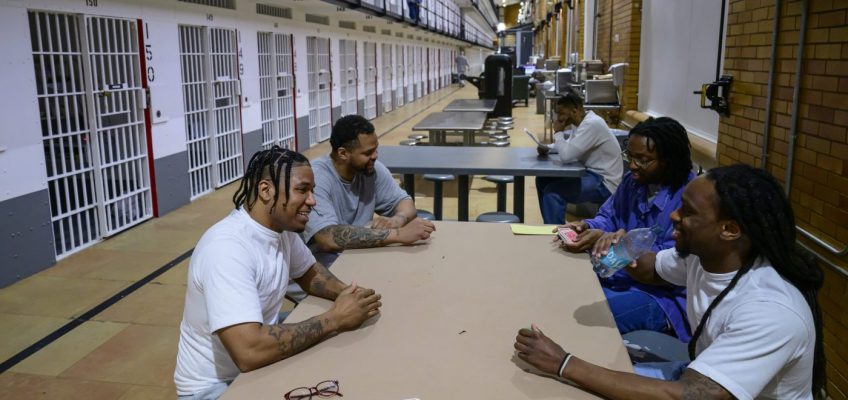The Stillwater prison looks, smells and sounds like a completely different place these days.
As Minnesota Department of Corrections officials prepare for the upcoming closure of the Minnesota Correctional Facility-Stillwater in Bayport in 2029, entire cell blocks have been shuttered. The prison’s population, once 1,200, is now just 503. The number of staff working at the prison also has dropped dramatically. In June, when the phased closure was announced, there were 567 staff working at Stillwater. There are now 231.
Most striking is a radical change in programming. Earned living units, designed for inmates who have done well during their time in prison, launched in September and will remain in effect until the prison closes by June 30, 2029. The men selected to participate — 298 as of Thursday — have made their own community rules, established accountability structures, and have been responsible for choosing incentives.
DOC Commissioner Paul Schnell said the intention is to replicate earned living units, honors units and incentive-based living units in all facilities in the coming years. Earned living units require fewer staff resources, allowing correctional facilities to direct staffing resources where they are most needed. This approach supports a safer, more stable environment for incarcerated people and staff, Schnell said.
Members of the media were invited to tour the units on Thursday and got to see the prison’s first barber shop, called Street Cuts; the prison’s new and improved tattoo shop; two new barbeque grills; the newsroom of “The Mirror,” the oldest continuously published prison publication in the world, and the start of a new inmate-designed mural honoring Corrections Officer Joseph Gomm, who was bludgeoned to death by an inmate at the Stillwater prison in 2018.
Lt. Sam Marks in the entryway of Cell Hall B-East. (John Autey / Pioneer Press)
“We went through a complete 180,” said Lt. Sam Marks, standing in the middle of Cell Hall B East. “If you would have walked down this hall a few years ago, you would have been terrified. I was the lead negotiator when we had our sit-in, and 120 (inmates) refused to go back to the rooms. … The amount of violence I’ve seen here in the last eight years, it’s astounding. Some of it will never leave me.
Marks, a 25-year veteran of the DOC, called the new approach “transformative.”
“It’s a different way of dealing with people on both ends. You sort of get institutionalized, and we’re kind of coming out of that. It’s a good thing. I don’t think the closure is a good thing, but I think that what we’re doing here is a good thing.”
Extra space
Each of the inmates in Cell Hall B are assigned two cells — one for sleeping and one for using however they want, Marks said. Some use the extra space for storing their possessions, making art, or even, in the case of Vincent Walker, growing an indoor herb garden. The cells in the earned living units are locked only at night and during the daily count.
Vincent Walker shows a list of herbs and peppers that he and Damon DiMartino, rear, are growing in an empty cell they have converted into a greenhouse. (John Autey / Pioneer Press)
Walker, 56, came to the earned living unit from Stillwater’s minimum-security unit, where he worked in the prison’s garden and took a horticulture class. When DOC officials asked what he wanted to do with his second cell, Walker said he wanted to create a greenhouse, complete with growing lights.
“We’ve got four varieties of basil — Italian, lemon, purple and Thai,” Walker said, during a tour of the small, bright space. “We also have cilantro, oregano, rosemary, thyme, lemon mint, peppermint and mountain mint. We keep track of the number of days for the harvest times.”
On Thursday, Walker was working on germinating pepper seeds in compostable egg cartons. Among the varieties: cayenne, Hungarian hot wax, poblano, California wonder, jalapeno and Hungarian sweet wax, he said.
“I don’t know how hot they’ll be,” said Walker, who is scheduled for release in January 2028. “We’re going to find out.”
New barber shop
Over in the prison’s lower recreation area, inmate Joe Soltis was giving a high-taper fade to fellow inmate Alex Keaton at the prison’s new barber shop. Soltis, 69, helped design and decorate the four-chair shop, Street Cuts, which opened five weeks ago, he said.
Licensed barber Joe Soltis trims fellow inmate Jordan Denk’s hair at the new barber shop called “Street Cuts.” (John Autey / Pioneer Press)
“We started with a blank slate,” said Soltis, a licensed barber who has been cutting hair for 49 years. “Before, each cell block had one cell that was designated for cutting hair. For 10 years, I’ve been trying to get something like this, and it finally happened. I’m proud of it. I’m proud of where it is. It’s not just a barbershop, it’s a place for the guys to come down and actually connect with each other and just enjoy being almost like outside of prison because it truly is nice.”
Soltis, who has served 26 years of his 30-year sentence, said he is grateful that DOC officials launched the ELU program.
“I’ve always wanted to say this: Prison can be a prison if prisoners act like prisoners,” Soltis said. “This is a building where people are acting like a community. People are coming together. It’s like any time we turn around and say, ‘Hey, we need some volunteers.’ We got 30, 40 people jumping to help.”
He said you don’t have to constantly remind the inmates who they are.
“We know who we are, and we know what we’ve done, and we’re trying to give back to the community in any way we can,” Soltis said. “But we’re also trying to make it better for people who come here, make mistakes and learn from those mistakes. … At the end of the day, you have to earn your place here every single day.”
Related Articles
ICE says they arrested 14 for immigration violations at St. Paul warehouse
Jury convicts 2nd man in Coon Rapids triple murder
3rd sexual assault case against former Bethel football player dismissed
Border Patrol is monitoring US drivers and detaining those with ‘suspicious’ travel patterns
Twin Cities ICE employee charged in child sex sting, Bloomington police say
Soltis’ next customer, inmate Keith Grube, 59, was drinking coffee and sitting in a lounge chair as he waited his turn. “I haven’t sat in something this comfortable in 32 years,” he said. “I hope they’ll expand this to other facilities once everybody sees how well this is run. This is amazing what they’re doing. Everybody is pulling together. It’s like nothing I’ve ever seen before. I was in the service, and I saw some glimpses of people coming together, but I’m really seeing it here.”
Grube said he transferred to the earned living unit at Stillwater from Moose Lake in September. “When I got here, I had to wait a week for all my property, and I didn’t even mind because it was that much better already,” he said.
Tattoo shop
Up in the prison’s new tattoo shop, relocated to the former art room from a space near the prison’s laundry area in the basement, inmate Daniel Gonzales was putting the finishing touches on inmate Matthew Fahey’s full-back tattoo. The design is a Gonzales original: a fire-breathing dragon and a knight.
Licensed tattoo artist Daniel Gonzales continues working on fellow inmate Matthew Fahey’s back piece in the new tattoo studios at the Minnesota Corrections Facility – Stillwater in Bayport on Thursday, Nov. 20, 2025. The prison is in the process of being shut down with inmates slowly being placed in other facilities. (John Autey / Pioneer Press)
Gonzales, 28, said he was selected to live in the earned living unit because of “good behavior, doing programming and staying out of trouble.”
“When I first came into prison, I was getting into trouble doing illegal tattoos and things like that,” he said. “But after a while, I changed. Something in me just clicked, and I changed what I was doing. Ever since then, it’s been an upward momentum of more positive things.”
Gonzales said the positivity and leniency gives inmates room to grow.
“When you’re surrounded by negativity, it tends to rub off on you. The opposite is also true: When you’re surrounded by positivity, it also rubs off on you. I’ve seen it in the guys. … We have something really good going on, and it’s more responsibility, too, because it’s not only for us, it’s for the possibility of other people to be able to do it later on.”
‘Landmark transformation’
Timothy O’Meara, an associate editor with “The Prison Mirror” newspaper, looks at art for an upcoming edition. (John Autey / Pioneer Press)
The launch of the earned living units program is a “landmark transformation” for the DOC, said inmate Timothy O’Meara, an associated editor of “The Mirror.”
“It’s the big story — the lead story of our next issue,” he said. “It’s a big leap for the Department of Corrections. They’re not exactly known for jumping into things and trying new things, but the transition to this new structure is just amazing. I can’t even express to you how different it is — just the environment and the people. It’s completely a radical change.”
Inmate Bryan Eaker, who also serves as an associate editor at the newspaper, said he felt some trepidation coming to Stillwater from Moose Lake in September to take part in the earned living units program.
“It was really scary,” he said. “Just because of everything that you hear about Stillwater.”
He said when his bus arrived and he saw the building, the thought he had made a mistake.
“I can’t believe that I can say that I’m in Stillwater, and I’m enjoying being in Stillwater,” Eaker said. “That’s weird to even think that that’s a possibility.”
O’Meara and Eaker said they are doing all they can to make sure the ELU continues on into the future.
“We’re hoping that the Department of Corrections is going to see the wisdom in having a facility like this,” O’Meara said. “They’re taking a chance, you know, and they’re giving us an opportunity to show that we deserve to be here. That’s our hope – that not only will it be here for us, but it will continue on after we’re gone.”
Eaker said he is optimistic that that will be the case.
“There’s been such a mentality shift,” he said. “I mean, you’re asking IPs (incarcerated people) to be different IPs, you’re asking staff to be different staff, and you’re asking administration to be different administration. And if one of those doesn’t work, it’s not going to work.”
Related Articles
Woodbury donates to food shelf using new charitable gambling fund
Woodbury man gets 30 years in federal prison for extorting minors after coercing sexually explicit videos
New $12M shelter for homeless — and their pets — set to open in Washington County
2026 Olympics will be Jessie Diggins’ last. Here’s why
Oak Park Heights ‘Taco Bell Mom’ Brenda Foley marks 30 years
Marks, the lieutenant, said he is all-in in making sure it works.
“It’s so nice to be able to come to work and say, ‘Hello’ and ‘How are you doing?’ to these guys and get it back and just have a pleasant atmosphere where we can kind of heal and they can change. We both can,” Marks said. “It’s my job to send these guys out better than they came in, and I think I can do that in a facility like this.”
In addition to launching the earned living units, DOC officials have expanded the prison’s Atlantis substance-use treatment program, increasing access to substance-use disorder treatment across the agency. As of Thursday, the program was at its full capacity of 93 inmates.
The rest of the prison population not eligible for an earned living unit, 112 inmates, are in segregation.




